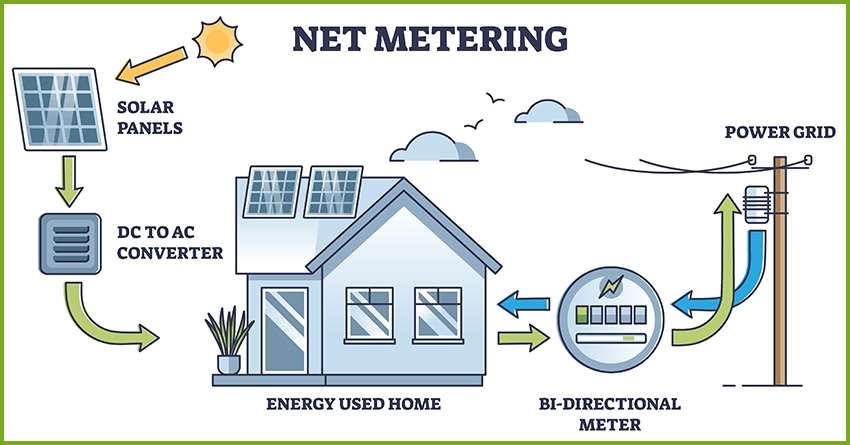What is Net Metering and How Does It Benefit Homeowners With Solar Panels?

What is Net Metering and How Does It Benefit Homeowners With Solar Panels?
What is Net Metering?
Adopting solar energy offers homeowners many great benefits. One of the best – for those who can take advantage of it – is net metering, also referred to as net energy metering. With net metering, you can be credited for any extra clean energy your solar panels produce and send back to the electric grid.
Net metering is particularly important in places with significant seasonal weather differences. When installers design solar panel systems, they take roof size and electricity needs into account. In Massachusetts and much of the Northeast, installers also carefully consider geography and weather patterns. A 6 kilowatt (kW) system in Massachusetts will produce less electricity over the course of a year than a 6 kW system in California because of the differences in weather patterns and sunshine.
To help you get the most out of your solar panels, your installer will cover as close to 100 percent of your electricity needs as possible given the amount of available roof space and regional factors. Thanks to Massachusetts’ net metering policy, solar system owners can “bank” net metering credits in the summer when there’s more sunshine and more hours of daylight. Then, come winter, they can use those credits to keep their monthly electricity costs low.
Most homeowners rely on the grid to power their homes some of the time, like at night for example. When that happens, your utility charges a regular retail rate for the grid electricity consumed. With net metering, that process goes in reverse. A system producing extra electricity through solar then sends it back to the grid making the electric meter run backward.
Under an ideal net metering program, you receive a credit for that grid-bound energy at the same retail rate charged by your utility for any in-bound energy needed. At the end of the billing period, the utility provides a credit on your electricity bill for the net amount of energy they send back to the grid, which gives us the name "net energy metering."
For many homes with solar systems, net metering can save people thousands of dollars a year. And while net metering does not typically “pay” homeowners money directly, it does drastically cut the cost of their energy bills, and that – along with free, clean energy each month – helps pay off the cost of their solar systems.
Solar power is a phenomenal investment and when you combine net metering with the federal solar investment tax credit (ITC), it can make going solar simply irresistible!
What is the Solar Investment Tax Credit (ITC)?
The Solar Investment Tax Credit (ITC) is a federal program that allows homeowners to receive a tax credit on a percentage of the cost of their solar energy system. The ITC for residential properties is currently set at 30% of the amount invested in an eligible solar system. This means that if you spend $20,000 on a solar system, you could receive a tax credit of $6,000 to offset the cost. The ITC also covers labor costs and developer fees, as well as solar energy storage units (battery backup) like the SunPower SunVault as long as they are powered solely by the solar panels associated with the system.
One important thing to note is that the ITC only applies to homeowners who purchase their solar system, rather than those who lease or use a solar power purchase agreement. The ITC has been a major contributor to the growth of solar energy in the United States, with the number of installations expanding by 12,000% since the tax credit was first introduced in 2006.
In addition to the ITC, state and local programs can also save homeowners money on their solar energy systems. Choosing a highly efficient panel, such as SunPower's residential solar panels, can also lead to long-term savings as they produce 55% more energy over 25 years compared to conventional panels. SunPower's panels are also the top-rated in third-party durability testing, ensuring they can withstand harsh weather conditions and consistently provide power to your home. Their Complete Confidence Warranty is also widely recognized as the best in the solar industry.
New England's #1 Solar Installer
Reach out to Viridis Energy to set up your no cost analysis with a professional solar consultant today. Get started below for a quick estimate of the savings you could see by installing solar panels. Our estimates use your location, shade level and electricity bill to provide an analysis of your solar potential.
SEE HOW MUCH YOU CAN SAVE BY GOING SOLAR
CALCULATE YOUR SAVINGS
